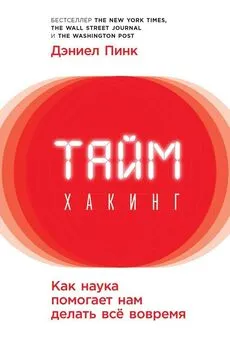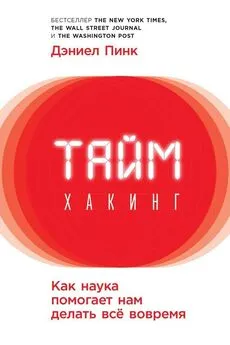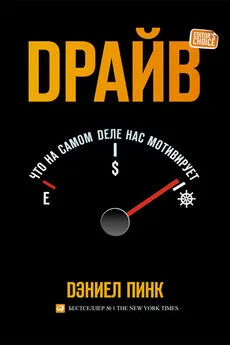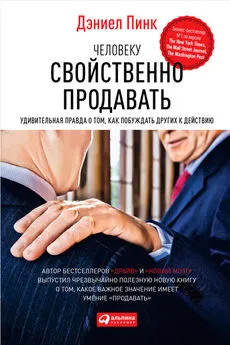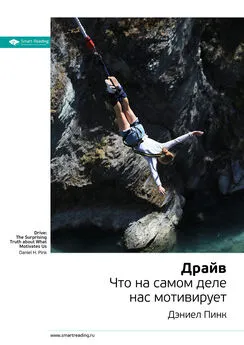Дэниель Пинк - Таймхакинг. Как наука помогает нам делать всё вовремя
- Название:Таймхакинг. Как наука помогает нам делать всё вовремя
- Автор:
- Жанр:
- Издательство:Литагент Альпина
- Год:2018
- Город:Москва
- ISBN:978-5-9614-1515-5
- Рейтинг:
- Избранное:Добавить в избранное
-
Отзывы:
-
Ваша оценка:
Дэниель Пинк - Таймхакинг. Как наука помогает нам делать всё вовремя краткое содержание
Таймхакинг. Как наука помогает нам делать всё вовремя - читать онлайн бесплатно ознакомительный отрывок
Интервал:
Закладка:
314
Wing-Yee Cheung et al., “Back to the Future: Nostalgia Increases Optimism,” Personality and Social Psychology Bulletin 39, no. 11 (2013): 1484–1496; Xinyue Zhou et al., “Nostalgia: The Gift That Keeps on Giving,” Journal of Consumer Research 39, no. 1 (2012): 39–50;
Wijnand A. P. van Tilburg, Eric R. Igou, and Constantine Sedikides, “In Search of Meaningfulness: Nostalgia as an Antidote to Boredom,” Emotion 13, no. 3 (2013): 450–461.
315
Xinyue Zhou et al., “Heartwarming Memories: Nostalgia Maintains Physiological Comfort,” Emotion 12, no. 4 (2012): 678–684; Rhiannon N. Turner et al., “Combating the Mental Health Stigma with Nostalgia,” European Journal of Social Psychology 43, no. 5 (2013): 413–622.
316
Matthew Baldwin, Monica Biernat, and Mark J. Landau, “Remembering the Real Me: Nostalgia Offers a Window to the Intrinsic Self,” Journal of Personality and Social Psychology 108, no. 1 (2015): 128–147.
317
Daniel T. Gilbert and Timothy D. Wilson, “Prospection: Experiencing the Future,” Science 317, no. 5843 (2007): 1351–1354.
318
M. Keith Chen, “The Effect of Language on Economic Behavior: Evidence from Savings Rates, Health Behaviors, and Retirement Assets,” American Economic Review 103, no. 2 (2013): 690–731.
319
M. Keith Chen, “The Effect of Language on Economic Behavior: Evidence from Savings Rates, Health Behaviors, and Retirement Assets,” American Economic Review 103, no. 2 (2013): 690–731.
320
Дискуссия началась с публикации: Edward Sapir, “The Status of Linguistics as a Science,” Language 5, no. 4 (1929): 207–214. Эту точку зрения отвергал в числе многих других также и Ноам Хомский в работе: Noam Chomsky, Syntactic Structures , 2nd. ed. (Berlin and New York: Mouton de Gruyter, 2002), хотя в последнее время отношение к ней было пересмотрено. См, например: John J. Gumperz and Stephen C. Levinson, “Rethinking Linguistic Relativity,” Current Anthropology 32, no. 5 (1991): 613–23; Martin Pütz and Marjolyn Verspoor, eds., Explorations in Linguistic Relativity , vol. 199 (Amsterdam and Philadelphia: John Benjamins Publishing, 2000).
321
См.: Hal E. Hershfield, “Future Self-Continuity: How Conceptions of the Future Self Transform Intertemporal Choice,” Annals of the New York Academy of Sciences 1235, no. 1 (2011): 30–43.
322
Daphna Oyserman, “When Does the Future Begin? A Study in Maximizing Motivation,” Aeon , April 22, 2016. (Электронная версия: https://aeon.co/ideas/when-does-the-future-begin-a-study-in-maximising-motivation.) См. также: See also Neil A. Lewis, Jr., and Daphna Oyserman, “When Does the Future Begin? Time Metrics Matter, Connecting Present and Future Selves,” Psychological Science 26, no. 6 (2015): 816–825; Daphna Oyserman, Deborah Bybee, and Kathy Terry, “Possible Selves and Academic Outcomes: How and When Possible Selves Impel Action,” Journal of Personality and Social Psychology 91, no. 1 (2006): 188–204; Daphna Oyserman, Kathy Terry, and Deborah Bybee, “A Possible Selves Intervention to Enhance School Involvement,” Journal of Adolescence 25, no. 3 (2002): 313–326.
323
Ting Zhang et al., “A ‘Present’ for the Future: The Unexpected Value of Rediscovery,” Psychological Science 25, no. 10 (2014): 1851–1860.
324
Dacher Keltner and Jonathan Haidt, “Approaching Awe, a Moral, Spiritual, and Aesthetic Emotion,” Cognition & Emotion 17, no. 2 (2003): 297–314.
325
Melanie Rudd, Kathleen D. Vohs, and Jennifer Aaker, “Awe Expands People’s Perception of Time, Alters Decision Making, and Enhances Well-Being,” Psychological Science 23, no. 10 (2012): 1130–1136. Помощь окружающим также расширяет наши временные горизонты, увеличивая субъективное ощущение «избытка времени». См.: Cassie Mogilner, Zoë Chance, and Michael I. Norton, “Giving Time Gives You Time,” Psychological Science 23, no. 10 (2012): 1233–1238.
Интервал:
Закладка:
